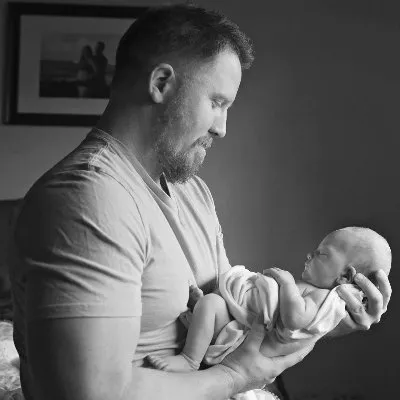Depending on the kind of church circles you’ve been around, the widely held belief in generational curses may be something you’ve been exposed to before.
People struggling with (or who are victims of) alcoholism, drug and sexual addictions, abuse and so on are often encouraged by charismatic Christians to pray against potential generational curses that may be in the family.
“Just in case you have a curse or some kind of demonic attachment in your family, let’s break/loose/bind it.”
Just in case! 👿
Entire ministries have been founded on this.
Now, I should preface this by saying two things:
- Theologically I disagree with it.
- If generational curses are true and based on sound theology then I’d probably be a great candidate.
Substance abuse, child neglect, assault and mental illness go back well over a century in my family.
There’s a history of drug and alcohol abuse on both sides of the family - I’ve had to watch the destruction it’s caused in the lives of both my parents and grandparents.
I was astounded recently when I did some ancestry research (Ancestry.com) and found a long, unbroken pattern of very familiar, life-destroying behaviour stretching back multiple generations (news articles from the 1800’s detailing domestic violence and child abandonment).
So all this lead me to wonder whether or not generational curses are actually feasible.
This can’t all be a coincidence, surely?
Of course, before even getting all spiritual and weird about it, there’s probably a very natural psychological explanation for generational patterns of dysfunction. Naturally, there’s a good chance a child who grows up being abused is going to either abuse or be a victim of abuse.
It just becomes a cycle.
Some would argue for genetic predispositions.
This pattern will just continue to be replicated generation after generation until somebody does something to change it.
As a practice in the Church, I think it should be discussed more often.
Before people start “loosing” curses, they should be talking realistically about helping disciples break inherited lifestyle habits.
If I’m honest, I’ve always been uncomfortable with curse-breaking talk.
I was never really confident about it being based on sound theology but just accepted it in good faith whenever somebody prayed like this over me - can’t hurt after all!
Does ‘breaking’ something like alcoholism mean anything at all in the context of prayer?
Or is it just a simple exercise in willpower?
Most importantly - does praying against curses become detrimental by causing us to avoid personal responsibility for change?
Where did the concept of ‘generational curses’ originate?
Well, the Old Testament is rife with it.
These are stories where God (YHWH) curses or punishes descendants of an individual for their own disobedience or hostility.
This verse (in the context of a warning against idolatry) is the most commonly quoted:
“I, the LORD your God, am a jealous God, punishing the children for the sin of the parents to the third and fourth generation of those who hate me.”
Ex. 20:5 (again in Ex. 34:7)
Take Ham also for example, Noah’s son (Genesis 9:25) whose carelessness led to the cursing of an entire nation of people (Canaan).
One could read the pronouncement by God that Ishmael’s descendants will be “wild as a donkey” with “everyone against them” as a generational curse too (Gen. 16:12).
The final plague in Egypt essentially inflicted mass death on the second generation of Egyptians for what the first generation had done.
And of course there’s the ultimate generational curse of Adam whose one act of disobedience resulted in the separation of billions of his descendants from God and plunged the world into what it is now (Gen. 3:14-19).
How do you reconcile this to the nature of Christ?
It’s definitely hard for us as Christians to think of God severely punishing whole innocent generations for what a single person or group of people did.
It’s hard to imagine anyone doing that to anybody.
Imagine if you committed a crime, and in retaliation, your kids and grandkids (who aren’t even born yet) were sentenced to prison.
That’s basically what it’s like!
But check out Ezekiel 18.
Ezekiel 18 (pretty much the entire chapter) is a pronouncement by God that he will no longer consider the sins of fathers against sons:
“Behold, all souls are Mine; the soul of the father as well as the soul of the son is Mine. The soul who sins will die.” Ezek. 18:4
“The person who sins will die. The son will not bear the punishment for the father’s sin, nor will the father bear the punishment for the son’s sin…”
Ezek. 18:20
Interestingly, many articles I’ve seen (like this one) don’t reference this.
Even if you believe and rely on scriptures like Exodus 20:5 where God pronounces that he will punish future generations for the sins of their fathers, you must concede that Ezekiel 18 is a promise that this will no longer be the case (in other words nullified).
Then of course – most importantly - we know as Christians that Jesus became a curse for us once and for all (Galatians 3:13).
The ultimate generational curse of Adam (sin and death) was broken by what Christ did for us and we are a new creation if - and only if - we are in Christ (2 Cor. 5:17).
It’s vital to consider this story in John 9:
His disciples asked him, “Rabbi, who sinned, this man or his parents, that he was born blind?”
“Neither this man nor his parents sinned,” said Jesus, “but this happened so that the works of God might be displayed in him.”
The story then goes on to show the Pharisees questioning the parents and finally accusing the healed man of being “born entirely in sins”.
So there was clearly an assumption here on the part of the Pharisees and the disciples that this man’s blindness was in fact caused by a generational curse of sorts – sins of his mother and father (no doubt rooted in their theology straight from Exodus 20:5).
Jesus points out how wrong they are in that it has absolutely nothing to do with his or his parents’ sins.
He moves the conversation away from talk of generational curses entirely.
The man’s suffering served to glorify God.
Just as we all serve to glorify God.
I wonder if charismatic evangelicals are guilty of the same ignorant belief system the Pharisees had in viewing everything as a punishment for generational sin.
You didn’t sin, nor did your parents; but it’s so that the works of God might be displayed in you
Every believer – especially every believer carrying the weight of a difficult upbringing - should own this verse (John 9:3).
Maybe it isn’t physical blindness that you were born into.
Perhaps you were born into a world of addiction. Or perhaps you were born into cycles of self-sabotage.
Whatever it is…
In the words of Jesus:
“It was so that the works of God might be displayed in [you].”
That’s not to say that God inflicted horrendous suffering on you to prove a point.
The world’s a sick place.
It’s full of brokenness and despair but every single story is an amazing opportunity for God to display his incredible works.
My own story has touched people’s lives so I’ve seen it for myself.
When I look at the history of my family that I mentioned above where generation after generation has repeated the same patterns of brokenness, I look at the change of direction and purpose in my own life and see God’s transformative work.
I was certain to carry on the cycle.
Before I found Christ, I was in and out of court all the time.
Police knew me by name.
I was an angry kid and frustrated with my circumstances but I thank God every time I think of where I might have ended up.
God’s works were displayed in me when I made a conscious decision to not use these circumstances as an excuse, and to allow Jesus to recreate me from the inside out.
Mine is the story of John 9 where Jesus healed a young man born into generational brokenness, irrespective of who sinned but so that God’s work might be displayed.
It’s Christ alone who gets the full credit for the transformation in my life.
Well… almost.
Your generational curse will never end until you decide to stop it
There’s one thing that I can claim credit for which I believe God cannot.
Maybe that’s an heretical statement!
But it’s the one thing I did to change my life for the better that was 100% my doing and not God’s (unless you believe in predestination).
I made a decision.
It was a decision to:
1. repent and follow the living God for the rest of my life and
2. end the cycle of abuse and pattern of dysfunction in my family line.
Ending “generational curses” is a choice.
You must decide to end it.
Not a one-time decision either but a daily one.
This means that I have to stop myself at times, reassess the situation and my attitude, and then do what’s not in my nature to do.
And what’s right is what lines up with what Jesus would expect of me in the same situation.
It’s an ongoing struggle.
At times it is tough but let me tell you – you begin to change inwardly and that Christ-like behaviour becomes more natural the more you live it.
My prayer now is that my son will live a fuller and better life for it.



Comment Policy: I can handle harsh criticism and disagreements, but if you're disrespectful or a self-promoter, your comment ain't gettin' published.